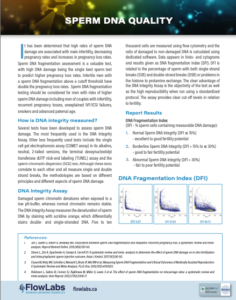Sperm DNA Quality
It has been determined that high rates of sperm DNA damage are associated with male infertility, decreasing pregnancy rates and increases in pregnancy loss rates.
Sperm DNA fragmentation assessment is a valuable test, with high DNA damage being the single best sperm test to predict higher pregnancy loss rates. Infertile men with a sperm DNA fragmentation above a cutoff threshold have double the pregnancy loss rates.
Sperm DNA fragmentation testing should be considered for men with risks of higher sperm DNA damage including men of couples with infertility, recurrent pregnancy losses, unexplained IVF/ICSI failures, smokers and advanced paternal age.
How is DNA integrity measured?
Several tests have been developed to assess sperm DNA damage.
The most frequently used is the DNA Integrity Assay. Other less frequently used tests include the single cell gel electrophoresis assay (COMET assay) in its alkaline, neutral, 2-tailed versions, the terminal deoxynucleotidyl transferase dUTP nick-end labeling (TUNEL) assay and the sperm chromatin dispersion (SCD) test. Although these tests correlate to each other and all measure single and double strand breaks, the methodologies are based on different principles and different aspects of sperm DNA damage.
DNA Integrity Assay
Damaged sperm chromatin denatures when exposed to a low pH-buffer, whereas normal chromatin remains stable. The DNA Integrity Assay measures the denaturation of sperm DNA by staining with acridine orange, which differentially stains double- and single-stranded DNA.
Five to ten thousand cells are measured using flow cytometry and the ratio of damaged to non-damaged DNA is calculated using dedicated software. Data appears in histo- and cytograms and results given as DNA fragmentation index (DFI). DFI is related to the percentage of sperm with both single-strand breaks (SSB) and doublestrand breaks (DSB) or problems in the histone to protamine exchange. The clear advantage of the DNA Integrity Assay is the objectivity of the test as well as the high reproducibility when run using a standardized protocol. The assay provides clear cut-off levels in relation to fertility.
Report Results
DNA Fragmentation Index
(DFI – % sperm cells containing measurable DNA damage):
1. Normal Sperm DNA Integrity (DFI ≤ 15%)
– excellent to good fertility potential
2. Borderline Sperm DNA Integrity (DFI > 15% to ≤ 30%)
– good to fair fertility potential
3. Abnormal Sperm DNA Integrity (DFI > 30%)
– fair to poor fertility potential
References:
Bungum M, Humaidan P, Axmon A, Spano M, Bungum L, Erenpreiss J, Giwercman A. Sperm DNA integrity assessment in prediction of assisted reproduction technology outcome. Hum Reprod. 2007;22:174-9.
Spanò M, Bonde JP, Hjøllund HI, Kolstad HA, Cordelli E, Leter G. Sperm chromatin damage impairs human fertility. The Danish First Pregnancy Planner Study Team. Fertil Steril. 2000;73:43-50.
Simon L, Emery B, Carrell DT. Sperm DNA Fragmentation: Consequences for Reproduction. Adv Exp Med Biol. 2019;1166:87-105.

